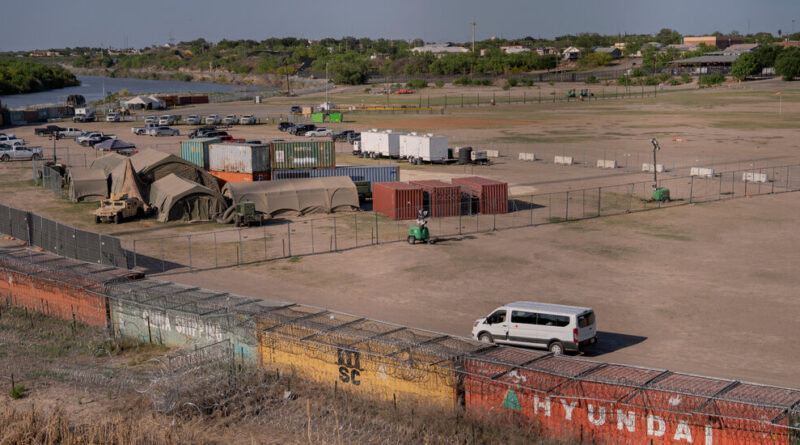As the Border Wars Recede, a Park on the Rio Grande Reopens to the Public
On Monday morning, as temperatures rose toward sweltering, Dora Flores warily approached the entrance of a modest park in the border city of Eagle Pass, Texas, wanting to see for herself whether the armed guards and concertina wire that had kept residents out for over a year had actually disappeared.
“Is the park really open?” Ms. Flores, 73, wondered aloud. “This used to look like a jail.”
The sudden reopening of Shelby Park in Eagle Pass this month was another sign of the changing of the guard in Washington, D.C., being felt far, far beyond the Beltway.
In the last year, the large but humble tract along the U.S.-Mexican border had served as a backdrop for political fights. Republicans had used it to showcase the “invasion” of migrants. Democrats converged to decry what they saw as overly aggressive immigration tactics. In January 2024, Gov. Greg Abbott of Texas took it over in a show of force, castigating the border policies of President Joseph R. Biden Jr. while keeping people like Ms. Flores away.
In recent days, to the relief of local residents, Shelby Park — with its soccer and baseball fields and a boat ramp into the Rio Grande — has become just a park again, almost. Citing record-low crossings, the state of Texas has quietly abandoned the park gates, rolled up most of the concertina wire there and left only a small crew by the river.
“We’re happy the park has returned to the city,” said the town’s mayor, Rolando Salinas Jr.
The semblance of normalcy underscores how the battle over immigration has migrated inland, to street corners of university towns, Democratic-led cities far from the southern border and courtrooms all over the country — as well as one enormous prison in El Salvador.
During the height of the immigration surge under Mr. Biden — when more than 1,000 migrants were crossing a day — Eagle Pass became ground zero for testing Texas’ limit in enforcing immigration law.
Governor Abbott angered many locals when he kicked out federal Border Patrol agents, directed National Guard troops to take over the park and proclaimed it private property so that anyone who entered it could be charged with trespassing.
Residents packed City Hall meetings to demand that Shelby Park be returned to the public. Mayor Salinas had deflected, saying that it had fallen out of favor anyway as young residents flocked to a new sports complex. He blamed the outcry on a “few loud voices.”
Still, he said, the park belongs to local taxpayers, not the state.
In a statement, the governor’s office said that the state had begun to pull out resources from the park after a sustained period of record-low crossings. Concertina wire, containers and other deterrents along the river bank would remain, along with a base with a capacity for 2,300 soldiers not far from the park.
“There is no longer a need for Texas to maintain northern-facing barriers,” said Andrew Mahaleris, a spokesman for Mr. Abbott.
Many area residents counted the partial departure as a bittersweet victory.
Days after the park gates reopened, Juanita Martinez, a local activist and chair of the Maverick County Democratic Party, stood on a patch of parched grass a stone’s throw away from the Rio Grande and studied a handful of state military officers pulling into a boat ramp.
Children used to play soccer on the weekends here, she recalled, and people from both sides of the border would attend large town festivals, including a Fourth of July fireworks display.
“God, this place had the most luscious, greenest grass,” she said, and pointed at the yellow land at her feet. “Pura tierra,” she said, “just dirt.”
Ms. Martinez then almost stepped over a piece of concertina wire, and exclaimed, “See? I almost cut myself.”
Mayor Salinas said that Governor Abbott should compensate the city for some of the damage left by a law enforcement presence that included Humvees guarding makeshift gates, coils of barbed wire, and men and women in camouflage patrolling the perimeter.
Jessie Fuentes, who owns a canoe and kayak business, allowed that the city had an immigration problem. But, he said, Governor Abbott went “overboard.” Mr. Fuentes has lost a lot of business since he was kept off the park and its surrounding waters, he said. He would like to see the rest of the officers pack up and leave.
“They had an objective; they completed that objective,” Mr. Fuentes said. “It’s time to go.”
Locals shopping at a pulga — or flea market — near the Rio Grande on Monday were eager to take advantage of the newly public space.
“They were taking things that belonged to the citizens,” Maribel Gonzalez, 58, said, referring to the park.
Fabian Acevedo, who frequently crosses from the neighboring Mexican city of Piedras Negras with his family of three, said he hoped the park could once again serve to unify the two countries. Eagle Pass and Piedras Niegras are connected by blood ties but separated by an international bridge.
“This was a park for people in both countries,” said Mr. Acevedo, 34, carrying his 2-year-old daughter, Megan. “I hope we go back to that.”

